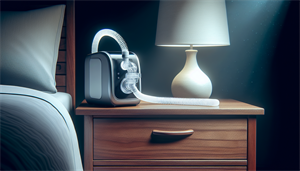For many people, the onset of allergies signals the beginning of sleepless nights. But have you ever stopped to wonder if there’s more to this relationship than meets the eye? The link between allergies and sleep apnea is one that’s often overlooked yet crucial to understanding for anyone juggling these two conditions.
Key Takeaways
-
Allergies and sleep apnea are closely related, with both worsening each other’s symptoms.
-
Allergy management strategies can improve sleep quality by reducing environmental allergens and incorporating medications into treatment plans.
-
Collaborative care is essential for accurately diagnosing and managing allergies & sleep apnea, involving regular checkups, lifestyle changes & allergy tests as needed.
The Connection Between Allergic Rhinitis and Obstructive Sleep Apnea
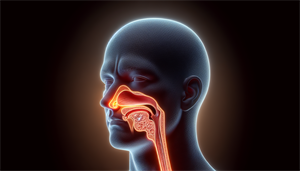
Allergic rhinitis and obstructive sleep apnea have a closer connection than you might realize. Both disorders share common symptoms such as daytime fatigue and irritability, creating an overlap that often goes unnoticed. When allergies flare up, nasal congestion and inflammation set in, making symptoms of sleep apnea worse and leading to more frequent sleep disturbances.
Sleep apnea and allergy symptoms have a cyclical relationship, where one could potentially worsen the other. Therefore, inadequate sleep brought on by sleep apnea can, in turn, worsen allergic reactions, creating a vicious cycle that makes managing either condition a challenge. Research even indicates that allergy sufferers tend to experience longer and more frequent episodes of obstructive sleep apneas, highlighting the influence of allergies on sleep disordered breathing.
How Allergies Affect Nasal Passages
Allergies can cause significant disruption to our nasal passages, leading to congestion and inflammation that impede normal breathing. This becomes especially troublesome at night, when the body is at rest. The nasal congestion caused by allergies has the potential to obstruct the upper airway, making it harder for air to flow freely. This can result in snoring, and in more severe cases, sleep apnea.
The problem escalates during allergy season. With the influx of allergens in the air, many allergy sufferers find themselves battling not only with a stuffy nose but also with a sleep disorder that leaves them feeling exhausted and lethargic the next day. It’s a double whammy that can take a significant toll on one’s health and quality of life.
Common Allergy Triggers
Common triggers such as pollen, dust mites, and pet dander can provoke allergies, resulting in sleep disturbances and possibly worsening sleep apnea. For instance, pollen, dust mites, and pet dander are all notorious for triggering allergic reactions that can contribute to sleep disturbances and exacerbate sleep apnea symptoms.
Being exposed to pollen can have a detrimental effect on sleep, leading to nighttime symptoms and reduced sleep quality. Allergies to pollen can cause tissue swelling and mucus buildup, potentially resulting in more frequent sleep apnea episodes.
Similarly, pet dander can induce allergic reactions that cause nasal congestion, leading to:
-
inflammation and swelling in the nasal passages
-
obstruction in the nasal passages
-
exacerbation of sleep apnea symptoms
-
development of sleep apnea
Consequences of Untreated Sleep Apnea and Allergies
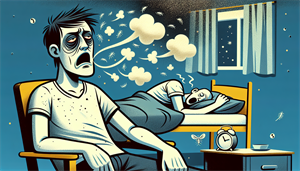
Not only do untreated sleep apnea and allergies cause discomfort, such as sore throat, but they can also profoundly impact your daily life and long-term health. The persistent congestion, sneezing, and coughing brought on by allergies can significantly disrupt sleep, leading to daytime fatigue and decreased daily functioning.
Moreover, leaving obstructive sleep apnea untreated can raise the likelihood of significant health issues such as:
-
stroke
-
heart disease
-
atrial fibrillation
-
diabetes
-
high blood pressure
Cognitive functioning may also be impaired, affecting aspects such as memory and hormonal regulation.
Impact on Daily Life
Sleep apnea and allergies not only cause physical discomfort but also significantly impact your cognitive function and emotional well-being. Both conditions can cause significant daytime tiredness, drowsiness, and fatigue, leading to challenges in concentration, memory retention, and reaction speed. This can result in decreased productivity at work and can even affect your personal relationships.
Moreover, the stress of dealing with these conditions can result in irritability, mood swings, and changes in attitude. Untreated allergies can weaken the immune system, making you more susceptible to other health complications. Similarly, individuals with sleep apnea face a heightened risk of depression, which can influence mood and overall sense of well-being.
Long-term Health Risks
Untreated sleep apnea and allergies pose severe long-term health risks. Sleep apnea can have serious implications for cardiovascular health, including:
-
high blood pressure
-
stroke
-
coronary artery disease
-
heart arrhythmias
-
clogged arteries It can also adversely affect heart muscle function.
Moreover, untreated sleep apnea can heighten the risk of:
-
diabetes by fostering insulin resistance and altering glucose metabolism
-
respiratory infections such as nasal allergies, upper respiratory tract infections, and sinusitis
-
allergic rhinitis
If allergic rhinitis is left untreated, it can result in chronic nasal inflammation, leading to complications and permanent damage to the lungs.
Sleep Apnea Treatment Options for Allergy Sufferers
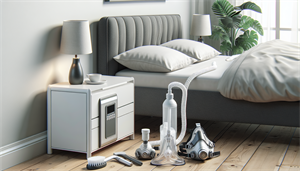
Fortunately, multiple treatment options are available for individuals dealing with both sleep apnea and allergies. These include sleep apnea surgery, continuous positive airway pressure (CPAP) therapy, and custom oral appliance sleep apnea therapy.
Individuals undergoing CPAP therapy should be aware of potential bacteria and allergen accumulation inside the CPAP hoses, as it could exacerbate allergy symptoms or cause additional health complications. Additionally, allergy medications that decrease nasal congestion can improve the effectiveness of sleep apnea treatment by relieving symptoms that could otherwise disrupt therapies like CPAP.
CPAP Therapy and Allergies
While CPAP therapy is a standard treatment for sleep apnea, individuals with allergies may need to make some adaptations. For instance, there are specific mask options designed to minimize exposure to allergens and improve overall comfort.
Recommended CPAP mask options for allergy sufferers include:
-
Hybrid designs like the DreamWear Full Face mask
-
Oral masks like the Fisher and Paykel Oracle
-
Interface options like the Innomed RespCare Bravo Nasal Pillow.
To keep your CPAP equipment free of allergens, it’s recommended to clean the machine and its parts every morning after use and perform a thorough soak of the mask, tubing, and reusable filter in warm, soapy water once a week.
Alternative Treatments
Alternative treatments can provide relief for severe allergy sufferers when CPAP therapy is insufficient. These treatments, such as oral appliances and APAP technology, offer different mechanisms to ensure easier breathing during sleep and address the individual needs of patients.
Oral appliances alleviate sleep apnea in allergy sufferers by reducing physical blockages of the airway. These devices are placed in the mouth to help keep the airway open, allowing for improved breathing during sleep.
On the other hand, APAP technology adjusts air delivery to match fluctuations in nighttime breathing, ensuring appropriate air levels during sleep. This feature makes it especially advantageous for individuals with severe allergies and sleep apnea.
Allergy Management Strategies for Better Sleep
Besides specific sleep apnea treatments, effective allergy management can also enhance sleep quality. Several strategies can be implemented, including modifications to the bedroom environment, personal hygiene practices, and the use of allergy medications.
Each of these strategies plays a role in reducing allergy symptoms and improving sleep quality. For instance, modifications to the bedroom environment can assist in managing allergies for improved sleep, such as keeping windows closed to prevent allergen infiltration, refraining from using ceiling fans, and maintaining a clean and organized bedroom. Personal hygiene practices can also minimize the influence of allergies on sleep, while allergy medications can provide relief from nighttime allergy symptoms.
Bedroom Environment
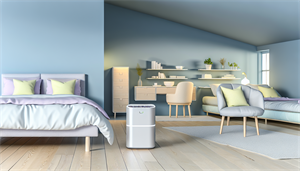
An allergy-friendly bedroom environment can greatly enhance sleep quality. Using air purifiers can effectively remove common household allergens such as mold, dust mites, pet dander, and pollen from bedroom air, thereby potentially enhancing sleep quality for individuals with or without allergies.
Moreover, maintaining dust-free furniture and refraining from incorporating ‘dust collectors’ such as stuffed animals, artificial flowers, and old books can help reduce allergy symptoms. For individuals with pet allergies, it’s recommended to sleep in a separate room from their pet to minimize exposure to pet dander.
Personal Hygiene
Good personal hygiene is fundamental to managing allergies and enhancing sleep quality. Simple practices such as showering before bed can effectively remove allergens such as pollen, dust mites, and pet dander from the hair and skin, reducing the likelihood of nighttime allergies and sleep disturbances.
Adjusting your laundry routines can also be beneficial. Regularly cleaning your bed linens can help eliminate allergens that may build up on your clothing and bedding, further reducing allergy symptoms and improving sleep quality.
Allergy Medications
Including allergy medications in your management strategy can be vital for treating allergies, controlling allergies, and enhancing sleep. Over-the-counter antihistamines and decongestants can offer relief from nighttime allergy symptoms.
While these medications can be a valuable tool, it’s important to remember that they’re not without their potential side effects. Some common side effects of allergy medications include:
-
Dry mouth
-
Blurred vision
-
Drowsiness
-
Dizziness
-
Depression
Additionally, the extended use of certain allergy medications, especially antihistamines, can induce drowsiness and disturb regular sleep patterns, potentially affecting the overall quality of sleep.
Collaborative Care: Working with Healthcare Professionals

A collaborative approach involving multiple healthcare professionals is needed to manage sleep apnea and allergies. From diagnosis and testing to ongoing management, your healthcare team is crucial in helping you navigate these conditions.
Diagnosing these conditions and initiating suitable treatment is a key responsibility of primary care physicians. Other healthcare professionals who can help include:
-
Allergists, who can help identify specific allergens and provide management strategies
-
Sleep specialists, who can diagnose and customize treatment plans for sleep disorders
-
Dieticians, who can help implement dietary modifications to alleviate symptoms and address food allergies.
Diagnosis and Testing
The first steps in managing sleep apnea and allergies involve diagnosis and testing. Sleep apnea is commonly diagnosed through a sleep study, where specialists monitor the patient’s brain and body activity while they sleep.
For allergies, diagnosis is usually based on a description of the symptoms provided by the patient and a thorough physical examination. In cases of persistent allergies, allergy tests may be conducted to pinpoint the specific allergens responsible for the symptoms.
Ongoing Management
To improve sleep quality and overall health, ongoing management of sleep apnea and allergies is crucial. This includes regular check-ups, medication adjustments, and lifestyle changes.
Regular check-ups can help monitor the progress of your treatment and make necessary adjustments. Some ways to manage sleep apnea include:
-
Medication adjustments to enhance night breathing and address nasal allergies
-
Lifestyle changes such as weight loss, consistent exercise, cessation of smoking, avoidance of alcohol, and establishing a healthy sleep routine
-
Allergy treatment
These strategies are crucial for ongoing management of sleep apnea.
Summary
Navigating the world of sleep apnea and allergies can be challenging, but understanding the connection between these two conditions is the first step towards better sleep and improved quality of life. From CPAP therapy and alternative treatments to allergy management strategies and collaborative care with healthcare professionals, there are numerous ways to manage these conditions. Remember, it’s not just about treating the symptoms, but about improving your overall health and well-being.
Frequently Asked Questions
Can sleep apnea be caused by allergies?
Allergies can indirectly cause sleep apnea, as nasal congestion caused by seasonal allergies can lead to more frequent obstructions and longer pauses in breath for those with sleep apnea. Allergic reactions can also swell the tonsils or adenoids, leading to a blocked airway and contributing to sleep apnea.
What allergy medicine is good for sleep apnea?
Anti-histamines such as Benadryl or Claritin, or decongestants like Mucinex or Sudafed, can be taken to reduce the effects of allergies and manage milder cases of sleep apnea.
What are 3 signs of allergic rhinitis?
Signs of allergic rhinitis include sneezing, itchy eyes, nose and throat, as well as a blocked or runny nose. These symptoms usually occur soon after being exposed to an allergen.
How do you flush allergens out of your system?
To flush allergens out of your system, try sinus rinsing with a saltwater or saline solution, as plain water has an irritating pH difference.
What are the consequences of untreated sleep apnea and allergies?
Left untreated, sleep apnea and allergies can lead to serious long-term health issues like diabetes, respiratory infections, and cardiovascular disease.
